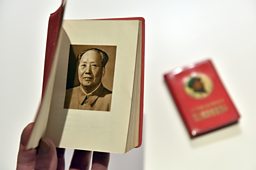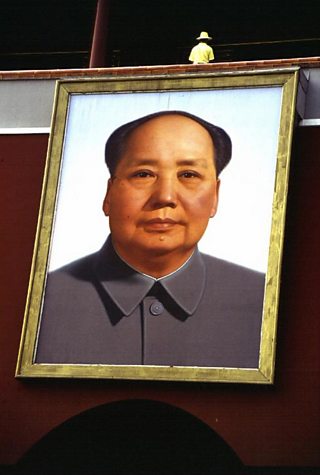David Aaronovitch on how Mao's Little Red Book went West
Quotations from Chairman Mao Tse-tung, also known as Mao's Little Red Book or The Thoughts of Chairman Mao, was a political tract from the most powerful leader in the East. David Aaronovitch explains how it became an icon in the West.
If anyone ever does a History of the 20th Century in 100 Objects, then one of the artefacts will be a small book, first published in the early 1960s. It is six inches by four inches, covered in red vinyl and with the smiling face of a Chinese man in military cap on the front. Inside are four hundred quotations from the same man, organised into 33 chapters. The man is the late Chairman Mao Zedong, leader of the Chinese Communist Party, The Great Helmsman of the world revolution.

The book works purely as a piece of design. It is portable, hard-wearing and brightly coloured, both functional and decorative and inimitably itself. It acts simultaneously as the thing it is (a book full of dos and don’ts for revolutionaries) and a visible symbol of revolution – like a badge or a flag. So if you were serious about bringing down the bourgeoisie and ushering in the worker’s and peasant’s dictatorship, or just wanted to look radical, the Little Red Book was the thing for you. It was produced in China in its tens of millions and then translated and exported abroad in hundreds of millions. In China a good part of the country’s print works was given over to this one publication.

In China itself the book was produced to emphasise the cult of Mao himself at a time when he felt challenged by other leaders following a time of enormous hardship for the Chinese people. It became a key weapon in the mass purges known as the Cultural Revolution, when officials and local leaders deemed to be insufficiently zealous in their support for the revolution were publicly humiliated and sometimes killed by mobs of so-called 'Red Guards' – often students or young workers.

Outside China, Mao was seen a one of the great living radical leaders alongside Fidel Castro and Che Guevara, the recently successful and youthful leaders of the Cuban Revolution. Russia’s Communist leadership by contrast seemed elderly and disappointingly moderate – more interested in producing cars and fridges than fomenting world revolt.
In the face of a world split into three camps – the capitalist and imperialist West, the pro-Soviet East, and then all the others - China represented the revolutionary potential of this Third World. Mao was the ultimate decoloniser, a model for every exploited and impoverished nation to follow. Kick out the imperialists and have yourself your own revolution.

For some radicals in the West, Mao showed the way to be the most rebellious kid on the block. No-one could be more seriously revolutionary than someone who had read and who could wave the Little Red Book. In divided Germany, both in the capitalist West and the communist East, Maoism offered a solution which blitzed both the consumerist Americans and the occupying Russkies. So much so that some Western Maoists engaged in the hazardous business of smuggling prohibited Chinese communist material into the differently communist East.
In the belly of the capitalist beast, the United States, Mao’s defence of revolutionary violence and his identification with anti-colonialism commended him to groups like the Black Panthers, who would sell the Little Red Book in their bookshops, and then use the proceeds to buy weapons. Such groups regarded revelations about Mao’s own tendencies towards dictatorship and repression as mere bourgeois propaganda. And many former members still do.

Fashion played its part elsewhere. Nowhere more so than France, where the legendary film director, Jean-Luc Godard, made one film called La Chinoise, in which some decidedly mignon French students become Maoists and surround themselves with barricades constructed from Little Red Books. Godard then went through a seriously Maoist period, turning out some seriously didactic movies, enlivened only by the occasional naked young woman talking earnestly about sexual exploitation under capitalism. Talk about having your brioche and eating it too.
In Britain, as one might imagine, Maoism was always likely to appear too earnest and exotic to escape the national sense of mockery. As a Communist teenager myself I recall a Maoist or two being on hand at any left-wing demonstration with a placard of Mao and a Little Red Book, and usually being the butt of jokes concerning the “paper tigers” and “running dog lackeys” that peppered Mao’s quotations.
The high point of the Little Red Book was probably the late 1960s and early 1970s. When Mao died in 1977 his international reputation almost died with him. Rapidly China turned itself from a revolutionary country with a missionary purpose to a superpower seeking a higher standard of living for its unenfranchised masses. The era of Little Red Book was over, its power gone. Only the memory remained.
More from Seriously...
-
![]()
Gavin Esler on The Good Goering
Did Nazi leader Hermann Goering have a brother who saved innocent lives from the Holocaust?
-
![]()
10 Women Who Changed Sci-Fi
A selection of great female authors who have radically altered the genre.
-
![]()
Pick-Your-Own Utopia
Dream away those mid-winter blues by pondering our selection of fantasy idylls.
-
![]()
Meet the Burlesque Legends
Mat Fraser meets the former striptease stars back on the stage in their 70s and 80s.
-
![]()
Piers Plowright's Picks
The legendary radio maker recommends seven great documentaries for Seriously...
-
![]()
Neil Gaiman's Orphee
A poetic retelling of the Orpheus myth, from the celebrated writer Neil Gaiman.
-
![]()
Meeting Music's Nostradamus
An aspiring singer-songwriter meets the man who predicted the demise of the music industry decades ago.
-
![]()
The Seriously Hard Quiz
What have you learned from our documentaries? Try our fiendishly difficult quiz...
-
![]()
The Draw of War: Walt Disney and World War Two
Kellie Redmond explores Disney's fascinating contribution to the war effort.
-
![]()
Harry Shearer on New Orleans
The Simpsons star, satirist and actor reflects on the flood that devastated his home town of New Orleans.
-
![]()
The Bletchley Girls: Cracking Women
Meet five codebreaking women who helped beat the Nazis and are still alive to tell their tales.
-
![]()
Why We’re Hung Up on the Hang
Seven reasons to love the modern melodic drum that creates a haunting tone.
-
![]()
Philip Hoare: CSI Whale
The award-winning writer on porpoise dissections, stranded whales and beached dolphins.













